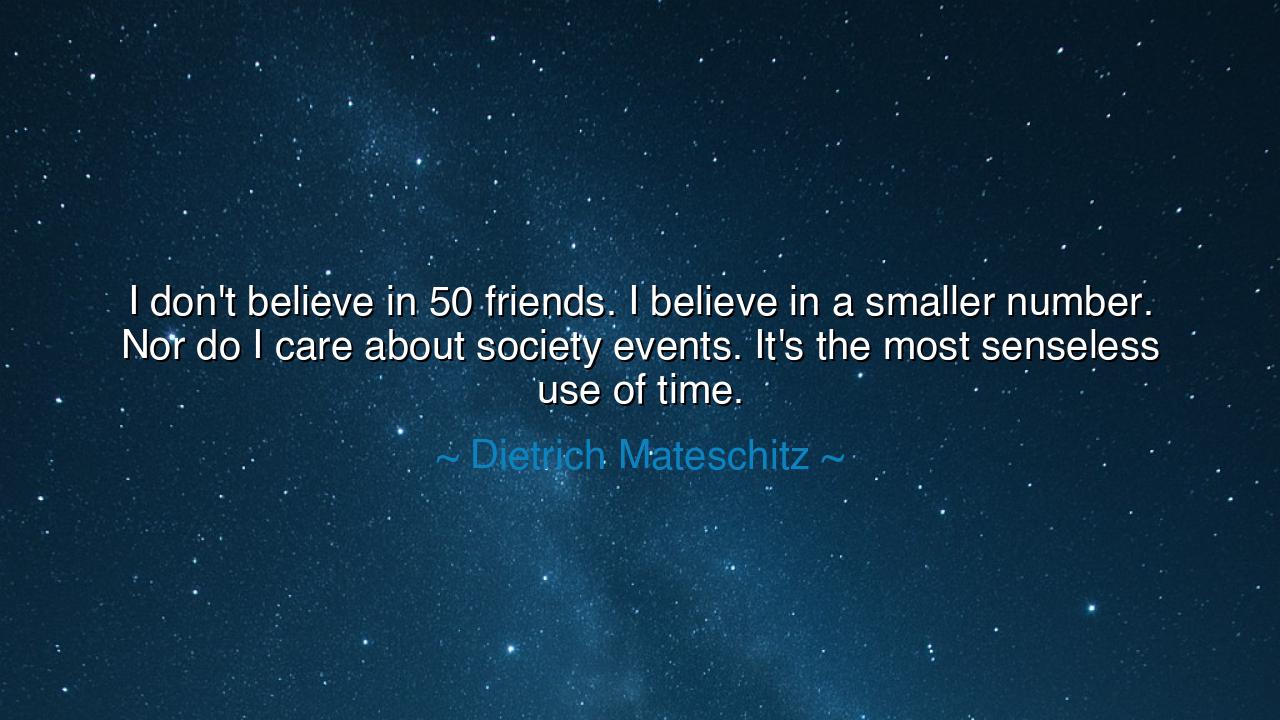
I don't believe in 50 friends. I believe in a smaller number. Nor
I don't believe in 50 friends. I believe in a smaller number. Nor do I care about society events. It's the most senseless use of time.






Hear the words of Dietrich Mateschitz, a man who built an empire yet held fast to simplicity: “I don’t believe in 50 friends. I believe in a smaller number. Nor do I care about society events. It’s the most senseless use of time.” These words cut against the vanity of the age. They remind us that greatness is not measured by the size of one’s circle, nor by the glitter of banquets and endless gatherings, but by the truth of loyalty, the depth of connection, and the wise use of one’s fleeting hours upon the earth.
For what are fifty friends if they are but names without devotion, faces without constancy, voices that vanish when the storm comes? Better to have one or two who stand firm, whose hearts are true, than to gather multitudes who scatter at the first sign of trouble. The ancients knew this well: friendship was not a number, but a covenant. To call someone “friend” was to say, “Your joys are my joys, your sorrows my sorrows.” Mateschitz’s words are thus not scorn, but wisdom—a call to choose depth over shallowness, truth over vanity.
Consider the life of Alexander the Great. He conquered nations and commanded armies that spanned continents. Yet in the end, it was not the thousands who marched at his side that pierced his heart, but the few who shared his soul—Hephaestion above all, his closest companion. When Hephaestion died, Alexander wept as though his own life had been torn away. From this we learn: even the greatest conqueror, with legions at his back, found his truest wealth in the bond of one friend.
And what of society events, the feasts and galas that consume the nights of the wealthy and the powerful? Mateschitz calls them “the most senseless use of time.” Why? Because such gatherings too often mask emptiness. They are theaters where people parade masks of status, but rarely show their true selves. History is filled with rulers who wasted precious hours in endless banquets while their kingdoms crumbled. Think of Nero in Rome, who feasted and entertained himself as the city burned, blind to the suffering of his people. Such is the folly of those who mistake noise for meaning, and spectacle for life.
The wisdom here is that time is the most precious coin we possess, and unlike wealth or land, it cannot be earned back once spent. To squander it on hollow gatherings or false friends is to betray one’s own life. To invest it in true bonds, in meaningful pursuits, in works that outlive the body—this is to live with purpose. Mateschitz, though surrounded by success and wealth, recognized that the soul hungers not for applause, but for authenticity.
The lesson for us is clear: measure your life not by how many friends you claim, but by the strength of the few who walk beside you when the road grows steep. Do not waste your nights in pursuit of empty appearances, but spend them in the company of those who nourish your spirit, or in the labor that brings meaning to your days. For the world offers endless distractions, but the wise learn to guard their time as a treasure beyond price.
Therefore, O listener, let your actions be these: seek out the few whose hearts are steadfast, and treasure them above gold. Decline the call of hollow spectacles, for they will leave you empty. Instead, build a life where your time is spent on what is eternal—love, creation, learning, and truth. In this way, though your circle may be small, it shall be strong, and though your days be limited, they shall be filled with meaning. For he who has one true friend, and who spends his time wisely, is richer than the one who stands surrounded by fifty shadows.






AAdministratorAdministrator
Welcome, honored guests. Please leave a comment, we will respond soon